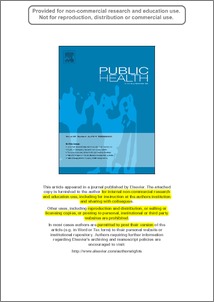Banu, Morsheda and Akter, Mahmuda and Begum, Khadiza and Choudhury, Rashedul and Nasreen, Hashima E
(2014)
'The clock keeps ticking' - the role of a community-based intervention in reducing delays in seeking emergency obstetric care in rural Bangladesh: a quasi-experimental study.
Public Health, 2014 , 128.
pp. 332-340.
ISSN 0033-3506
![[img]](http://irep.iium.edu.my/style/images/fileicons/application_pdf.png)  Preview |
|
PDF (Community-based intervention reduces delays in seeking emergency obstetric care)
- Published Version
Download (931kB)
| Preview
|
Abstract
Objective: To explore the role of a community-based intervention in reducing delays in accessing emergency obstetric care (EmOC) in rural Bangladesh, and the factors associated with delayed decision making, reaching the health facility and receiving treatment.
Study design: Quasi-experimental study.
Methods: Multistage random sampling was used to select 540 villages, from which 1200 women who reported obstetric complications in March–April 2010 were interviewed.
Results: The median time taken to make the decisions to access health care was significantly lower in the intervention areas compared with the control areas (80 vs 90 min). In addition, the median time taken to reach the health facility was significantly lower in intervention areas compared with the control areas (110 vs 135 min). However, no difference was found in the median time taken to receive treatment. Multiple linear regressions demonstrated that community intervention significantly reduced decision making and time taken to reach the health facility when accessing EmOC in rural Bangladesh. However, for women experiencing haemorrhage, the delays were longer in the intervention areas. Protective factors against delayed decision making included access to television, previous medical exposure, knowledge, life-threatening complications during childbirth and use of primary health facility. Financial constraints and traditional perceptions were associated with delayed decision making. Complications during labour, use of a motorized vehicle and use of a primary health facility were associated with faster access to EmOC and poverty, distance, transportation difficulties and decision making by male guardian were associated with slower access to EmOC.
Conclusions: The intervention appeared to reduce the time taken to make the decision to access health care and time taken to reach the health facility when accessing EmOC. This study provides support for a focus on emergency preparedness for timely referral from the community.
Actions (login required)
 |
View Item |


 Download Statistics
Download Statistics Download Statistics
Download Statistics